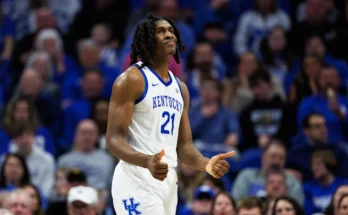In a historic announcement, ESPN has declared legendary running back Bo Jackson as the Greatest of All Time in college football. This designation places Jackson at the pinnacle of a sport that has produced countless remarkable athletes, many of whom became household names both during their collegiate careers and in the professional leagues that followed. Jackson’s selection over other college football icons such as Tim Tebow of the Florida Gators, Herschel Walker of Georgia, Barry Sanders of Oklahoma, and Earl Campbell of Texas, speaks volumes about his unmatched impact on the game and his lasting legacy in the sport.
Born in Bessemer, Alabama, Bo Jackson’s college career is a tale of extraordinary athleticism, breaking records and defying the limits of human performance. His tenure at Auburn University from 1982 to 1985 is often cited as one of the most spectacular periods of dominance in the history of college football. While all the players in the discussion for the greatest college football player—Tebow, Walker, Sanders, and Campbell—achieved monumental success, Jackson’s combination of physical ability, versatility, and sheer dominance on the field places him in a category of his own.
One of the most significant factors in Jackson’s selection as the greatest of all time is the extraordinary level of athleticism he displayed. Jackson was not just a football player; he was a physical phenomenon. His combination of size, speed, strength, and agility was unparalleled, making him a true marvel in college football. Standing at 6’1″ and weighing 230 pounds, Jackson possessed the kind of rare blend of power and speed that made him a constant threat to opposing defenses. His 4.12-second 40-yard dash time is a figure that still stands as one of the fastest ever recorded for someone of his size. This combination of traits allowed him to dominate not only as a running back but also in other facets of the game.
Jackson’s college football career began in 1982, and from the very start, it was clear that he was no ordinary athlete. As a freshman, he immediately made an impact by rushing for 829 yards and five touchdowns, showcasing the skills that would later make him a legend. By his sophomore season in 1983, he had cemented himself as one of the most electrifying players in the nation. His performance during the 1983 season included several jaw-dropping runs, but one of the most iconic moments of his college career came in the 1983 Iron Bowl against Alabama. In that game, Jackson rushed for 256 yards and three touchdowns, including one of the most famous runs in college football history—a 71-yard gallop that highlighted his speed and strength, as he shook off multiple defenders to reach the end zone.
The defining moment of Jackson’s college career, however, came in 1985, when he won the prestigious Heisman Trophy. His 1,786 rushing yards and 17 touchdowns in that season earned him the honor, and his dynamic play helped Auburn to a 9-1-1 record. Jackson’s dominance on the field was clear, and his Heisman win solidified his place in the annals of college football history. But it was not just his rushing ability that made Jackson so special—it was his ability to impact the game in multiple ways. In addition to his prowess as a running back, Jackson was also an excellent kick returner and played on special teams. His versatility, combined with his incredible skill set, made him a player unlike any other, and this wide-ranging impact on the field played a major role in his selection as the greatest college football player of all time.
While Jackson’s athleticism is perhaps the most celebrated aspect of his career, another key element of his legacy is his ability to transcend the sport. Jackson is perhaps one of the most recognizable dual-sport athletes in history, playing both college football and professional baseball at the same time. His decision to pursue both sports was a bold one, but it paid off in ways few could have imagined. Jackson played baseball for the Kansas City Royals, and while his baseball career did not reach the same heights as his football career, it still marked him as one of the rare athletes capable of competing at the highest level in multiple sports. This ability to excel in two highly demanding athletic arenas only added to Jackson’s legend and made his place in the history of college football all the more secure.
Comparing Jackson to other college football legends, such as Tim Tebow, Herschel Walker, Barry Sanders, and Earl Campbell, is no easy task. Each of these players made indelible marks on the sport, and their achievements in college football are nothing short of extraordinary. Tim Tebow, for example, led the Florida Gators to two national championships and won the Heisman Trophy in 2007. His leadership, poise, and ability to perform in clutch moments were unparalleled, and he was an icon of the college game during his time. Herschel Walker, similarly, was a dominant force for the Georgia Bulldogs, earning multiple All-American honors and winning the Heisman Trophy in 1982. Walker’s combination of size, speed, and strength made him one of the most unstoppable running backs in college football history.
Barry Sanders, another player often mentioned in discussions of the greatest of all time, revolutionized the position of running back with his unique style of play. In 1988, Sanders rushed for a staggering 2,628 yards and 37 touchdowns, breaking numerous records and winning the Heisman Trophy. His ability to change direction and elude defenders was unlike anything seen before, and his 1988 season remains one of the most remarkable individual campaigns in college football history. Earl Campbell, the powerful running back for the Texas Longhorns, was similarly dominant during his time in college. Campbell was a force of nature, combining size and strength with incredible speed and vision. His 1977 Heisman win was the culmination of a brilliant college career that included leading Texas to a national championship.
While each of these players had remarkable careers, Bo Jackson’s combination of size, speed, and impact across multiple sports made him a more complete and dominant force than any of his contemporaries. His college career is defined by his record-breaking feats, his ability to perform in clutch moments, and his unparalleled physicality. Unlike any other player in college football history, Jackson demonstrated that he could do it all, and his selection as the greatest of all time is a testament to his extraordinary legacy.
Moreover, Jackson’s influence extended far beyond his time at Auburn or even his professional career. He became a symbol of greatness, an example of what is possible when natural ability is paired with unrelenting work ethic. His legacy is woven into the fabric of college football, and his story continues to inspire generations of players who hope to reach the same heights. Jackson is remembered not just as a player, but as a trailblazer, someone who changed the way we think about athleticism and the potential of the human body.
In the end, the decision to name Bo Jackson the Greatest of All Time in college football is more than a reflection of his achievements on the field. It is an acknowledgment of the sheer impact he had on the sport, the way he captivated audiences, and the way he elevated the game to new heights. In an era filled with incredible athletes, Jackson’s unique blend of talent, charisma, and versatility sets him apart as the ultimate college football legend. He was not just a running back—he was a phenomenon, and his place at the top of college football’s all-time rankings is more than well deserved.



